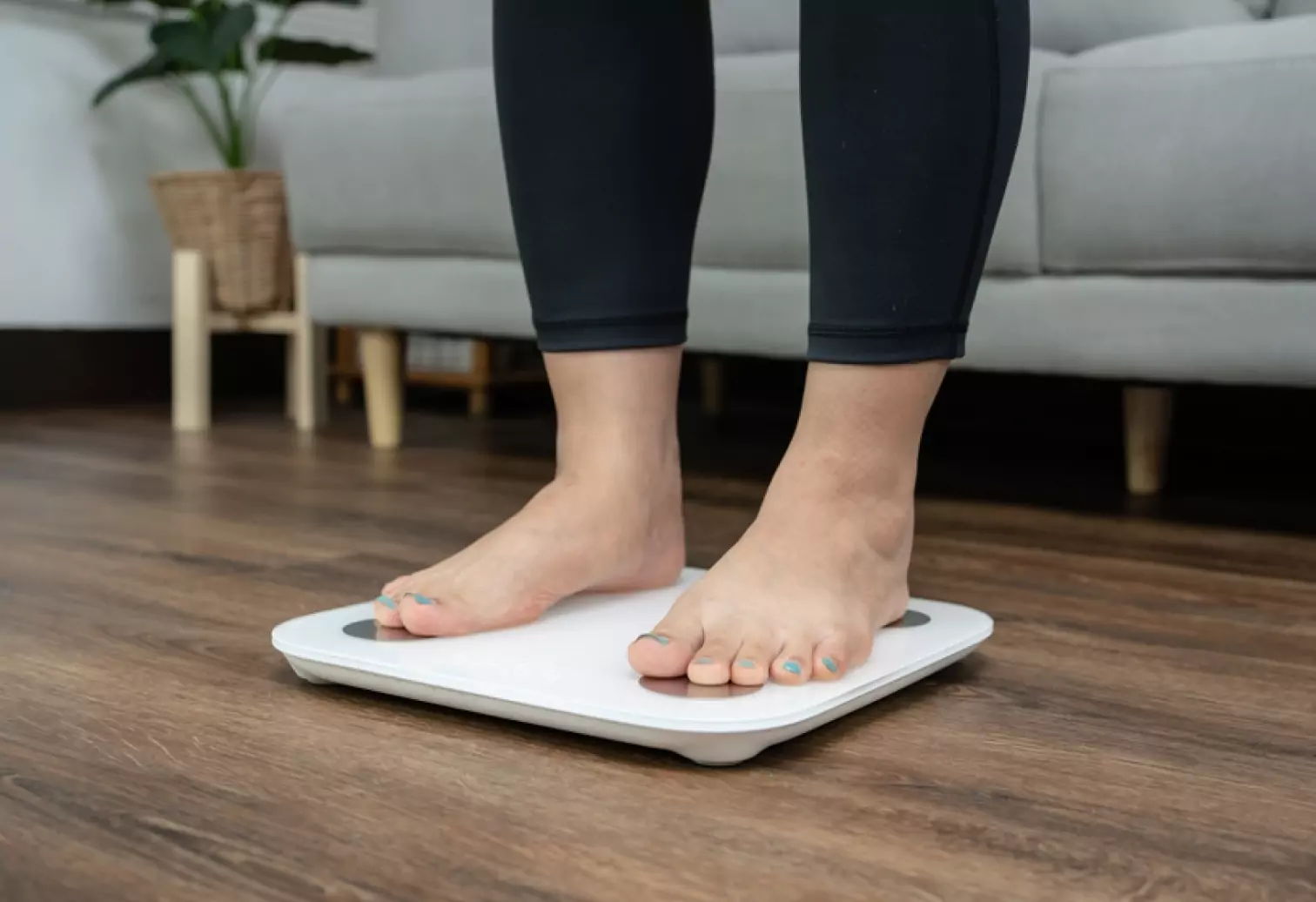8 Obstacles to Losing Weight and How to Push Through Them

Key Takeaways
One of the most challenging things about losing weight can often be overcoming all the obstacles that can stand in your way. From weight-loss plateaus and lack of motivation to undereating and overtraining, many challenges come hand-in-hand with trying to shed pounds and maintain a healthy weight.
Overcoming them can be daunting, but it's not impossible. With the right mindset and a helping hand, you'll be on your way to reaching your goals in no time! Read on to see how to push through some common obstacles to losing weight.
1) Being Obsessed With the Number on the Scale

To lose weight and keep it off, you need to develop a healthy relationship with food and your body. It means trying (it can be challenging!) not to be obsessed with the number you see on your scale.
While the scale can be a helpful tool, it's important not to become obsessed with it. Remember that muscle weighs more than fat and body composition changes along with water fluctuations may result in not seeing the number change on the scale right away
Women especially retain and lose water weight, along with bloating, throughout their menstrual cycle. This may be discouraging if you are tracking progress daily.
Focusing too much on your weight may lead to eating disorders and other unhealthy eating. Don't let the number on the scale discourage you. Instead, focus on your overall progress and how you feel physically and emotionally.
How to Overcome it
- The most important thing is to focus on creating healthy habits and being mindful of how your body feels.
- If you want something to measure daily, try measuring your waist with a soft tape, like the ones tailors use. Again, there is no need to be obsessive with this as many factors could impact this measurement.
- Remember that your weight will fluctuate daily, so using this tool may be a better option for tracking your progress over time.
2) Inappropriate Calorie Intake

To lose weight, you need to create a calorie deficit, which means burning more calories than you consume in a day. You can do this by eating healthy foods and exercising regularly.
Losing weight is hard enough, but making sure you're losing fat and not muscle can be even more challenging. Every body is different, so you have to remember when it comes to the appropriate amount of calories for you, there’s no one-size fits all. Underestimating the amount of calories your body needs may result in the break down of muscle tissue for energy.
All of this may lead to serious health problems and make it even harder to lose weight in the future. So, make sure you're aiming for the appropriate calories to meet your specific needs!
How to Overcome it
- Depending on your weight, activity level, and goals, the number of calories you should consume each day will vary. Consult a doctor, personal trainer, or registered dietitian to determine your caloric intake based on your age, physical activity, and weight loss goals.
- A moderate calorie deficit is essential to promote gradual weight loss, but calories aren’t the only thing that matters. Exercise, movement and the quality of dietary choices also matters.
- You need a balanced approach to your diet along with including activities that help to burn calories and fat to lose weight in a gradual and healthy way. Losing weight too quickly and cutting too many calories can adversely affect your health and body.
3) Over Exercising

Overexercising during your weight loss journey (and at any other time, for that matter) can be dangerous and counterproductive. Despite this, many people are unaware of the risks associated with overtraining and still push themselves too hard.
Take lifting weights, for example. It's a great way to become more physically fit and burn fat. Still, it is important to remember that this exercise builds muscle, which weighs more than fat.
So, you might find yourself gaining weight on your scale before losing it. But if you're patient and stick with it, you'll eventually start seeing (and feeling!) the benefits.
How to Overcome it
- You need to discover the importance of listening to your body and taking days off from exercise when you need to.
- You’re more likely to injure yourself if you’re overexercising. Which can set your weight loss goals back.
- Remember that you won't see results overnight. Lifting weights for weight loss takes time and consistent effort.
- Small, consistent workouts are just as effective as intense workouts.
{{rich-text-cta-wl1="/style-guide"}}
4) Not Consuming Enough Protein and Fiber

When you're trying to lose weight, you might think that cutting down on calories is the way to go. However, if you're not careful, you could also cut out essential nutrients.
Protein and fiber, in particular, are two nutrients that can help you lose weight while staying healthy. Protein enables you to maintain lean muscle mass, which is crucial for burning more calories. Fiber helps keep you feeling full so that you're less likely to overeat. Healthy fats like avocados, nuts, and fatty fish, in moderation, have a great impact on satiety. Plus, dietary fat helps with the absorption of fat soluble vitamins.
So if you're not getting enough of these two nutrients while trying to slim down, it could be working against your goal. Also, ensure you include plenty of high-protein, high-fiber foods in your diet to help promote a healthy weight. It can be a difficult task, especially if you don't know how to eat enough protein and fiber.
How to Overcome it
- Start your day off with a high-protein breakfast. Consuming protein early in the day will help keep you feeling full. Try a full fat, plain yogurt or eggs for a quick and healthy start to your morning.
- Fill up on fiber-rich foods at breakfast, lunch and dinner. Veggies, fruits, whole grains, and legumes are all excellent sources of fiber. Filling up on these foods will help prevent you from overindulging in high carbohydrate foods and sugars.
5) Not Getting Enough Sleep
Most people try to lose weight by cutting calories and increasing the amount they exercise, thinking that those are the only factors that count on their weight loss journey.
But what if you're not getting enough sleep? Lack of sleep can counteract your efforts to lose weight and may be sabotaging your diet efforts. You probably feel tired, have no energy, and feel hungry all the time if you aren’t getting enough sleep.
How to Overcome it
- Create a routine around your bedtime to ensure that you get enough sleep. Set a general sleep and wake time, and stick to it!
- You can help stick to a sleep schedule by setting a general time range that you eat breakfast and dinner, too.
- Begin by enjoying a book in bed before your set bedtime. It will help you establish the routine of getting to bed on time and help you relax enough to sleep earlier.
6) Not Drinking Enough Water

Losing weight can be a complicated process, but there may be ways to make it easier. One of the ways to make it easier is by ensuring you're drinking enough water.
Many people don't drink enough water when they're trying to lose weight, making the process more complicated than it needs to be.
Research shows that hydration is a vital part of weight loss. In fact, if you're not drinking enough water, you may be preventing your body from losing weight. When you hydrate properly it allows your digestive system to effectively digest and pass on nutrients to your body.
Additionally, you may be more likely to become hungry or overeat if you haven’t had enough water—some research suggests water helps you feel fuller for longer after a meal.
How to Overcome it
- Start your day with a large glass of water. It will also help you eat an adequately portioned breakfast and help you stay full until lunchtime.
- Get a gallon or liter jug or water bottle. You can fill it and see how much water you are drinking throughout the day. How much water you need to drink will depend on your age, weight, medications you take, and exercise regime.
- The National Academies of Science, Engineering, and Medicine recommends that men drink 125 ounces (3.7 liters) of water per day and women drink 91 ounces (2.7 liters) per day. Discuss this amount with your doctor or a dietitian if you exercise heavily or take prescription medications.
7) Not Focusing on Nutrient-Density and Quality Foods

If you're trying to lose weight, you may be making it more difficult if you're not focusing on eating nutrient-dense and high-quality foods. So, in an attempt to facilitate sustainable weight loss, along with improving your overall health it may be beneficial to pack your diet full of nutrient dense foods.
It means ensuring that most of the foods you eat are packed with nutrients like vitamins, minerals, fiber, and healthy fats while being low in unhealthy ingredients like added sugar and refined grains. This approach is more effective for losing weight and improving health outcomes than other methods like counting calories or cutting out certain food groups.
How to Overcome it
- Balance your meals with high quality sources of protein, healthy fats, and fiber filled fruits, vegetables and complex carbohydrates.
- Avoid foods containing large ingredient lists with additives like sugars, preservatives, and refined carbohydrates.
- Try and opt for fresh produce, along with minimally processed whole grains and protein.
8) You Have Unrealistic Weight-Loss Goals
Losing weight can be a difficult task, but it can be even more difficult when you set unrealistic goals for yourself. If you want to lose weight healthily, it's important to set achievable and realistic goals.
Unrealistic goals can lead to disappointment and frustration, which may cause you to give up on your weight loss journey altogether. By setting achievable goals, you can stay motivated and continue working towards your ultimate goal of losing weight.
How to Overcome it
- Instead of striving for an unrealistic goal that you think you should follow, set a realistic goal that you can actually achieve.
- If you aren’t sure what a realistic goal is for your body and individual needs, consult with a doctor or a registered dietitian. Working with a professional is a great way to understand how to set healthy, realistic goals for your weight loss journey.
Try This 30-Day Weight Loss Challenge

Weight loss goals often seem unachievable because they're complicated, arbitrary, or follow a one-size-fits-all diet. You may try to lose too much weight too quickly when you should be aiming for something more realistic, like one or two pounds per week (depending on your body and needs).
When you don't see results fast enough, it’s easy to become discouraged and give up. But here's the thing: losing weight can be an uphill climb for most people, and whether you're trying to lose a few pounds or a lot of weight, the process is likely to be daunting and filled with obstacles and setbacks.
Luckily, there are things you can do to stay motivated, make sure you're not hitting a plateau, and jumpstart your weight loss journey.
Consider setting a 30-day weight loss challenge for yourself. It can be a great way to get motivated and achieve your goals. Since there's no one-size-fits-all for weight loss, the Nutrisense Nutrition Team recommends beginning with a healthy challenge: examine your dietary choices, daily habits, and exercise routine for 30 days.
Consider consulting with your doctor, dietitian, or personal trainer to develop a personalized plan for a 30-day challenge once you understand the small habits you would like to change. Here's how to start:
Week 1

If you're trying to lose weight, consider closely examining when you eat and what you're eating. Use Week 1 to start a food journal or choose an app to track your meal choices and times.
Start looking at patterns that you see in your meal timing, and pay attention to how you are balancing your meals. You may find that you're eating too late in the day, or not balancing your carbohydrates with proteins and fiber. This may help you make minor adjustments to your dietary lifestyle to help you lose weight sustainably and healthily.
Week 2

Add an exercise journal (you can combine this with your food journal). Write down how much activity you have each day. If you have a smartwatch, you can use this to track your steps and even see how much you are sitting and standing every day.
If you are new to working out, use this time to write down some workout ideas and see which ones you have fun doing. You should aim to make sustainable choices to stick to this plan.
Maybe you try Pilates but find that it isn’t your thing. Cross that off the list and try going to a spin class next time! It’s okay to experiment until you find something that makes you want to stick with it.
Week 3

Now that you've taken the first two weeks to examine your habits and schedules around diet and exercise, you can begin to set long-term goals. Use your journal to set challenges for yourself.
For example, if you're currently getting 20 minutes of light exercise three times a week, challenge yourself to make that 30 minutes of exercise four times per week. Try setting a distance goal if you're running or a weight goal for the next month if you're lifting weights. Tracking your progress can help motivate you to keep going.
Week 4

Use Week 4 to set a schedule now that you understand the changes you want to begin making. Set some time aside to cook and prepare meals, along with planning workouts that won’t be interrupted by work or social schedules.
To make a weight loss journey work long term, it is beneficial to set realistic goals and time commitments. This ensures that your weight loss is being achieved healthily and may even make it easier to maintain a healthy weight once you hit your goals.
Many people, once they lose the weight they want to, lose motivation and regain that weight because they didn’t create a sustainable and healthy lifestyle to support weight loss maintenance long term.
Find the right Nutrisense programto turn insight into progress.
Go Beyond Glucose Data with Nutrisense
Your glucose can significantly impact how your body feels and functions. That’s why stable levels are an important factor in supporting overall wellbeing. But viewing glucose isn't enough. Nutrisense, you’ll be able to learn how to use your body's data to make informed lifestyle choices that support healthy living.
One-to-one coaching
Sign up to access insurance-covered video calls to work with a glucose expert: a personal registered dietitian or certified nutritionist who will help tailor your lifestyle and diet to your goals.
Monitor and measure what matters
With the Nutrisense CGM Program, you can monitor your glucose with health tech like glucose biosensors and continuous glucose monitor (CGM)s, and analyze the trends over time with the Nutrisense App. This will help you make the most informed choices about the foods you consume and their impact on your health.
Find your best fit
Ready to take the first step? Start with our quiz to find the right Nutrisense program to help you take control.

Natalie received her degree in Dietetics from Mansfield University and a Master’s in Clinical Nutrition from the University at Buffalo. Her career has included nutrition education and program development in her local community, adjunct faculty at several collegiate institutions, and clinical nutrition in both inpatient and outpatient settings.




